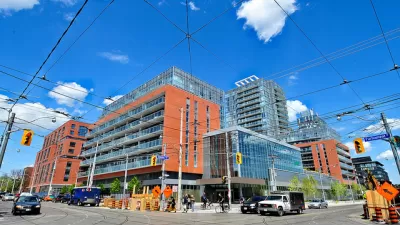Smart Planet talks with transportation researcher Reid Ewing about a new study he co-authored about how different development patterns can reduce auto use.
But it's not just density that helps reduce car use. In fact, the study fond that mix of uses has more of an impact on reducing car use than density.
"Planners for the last 40 years have been calling for mixed-use development, but we haven't known how beneficial mixed-use development was in terms of discouraging driving and encouraging walking and transit use. The study provides an estimate [of] just how important it is to balance jobs and housing in a neighborhood, rather than having all housing or all jobs.
The study made an attempt to generalize across something like 60 individual studies. It provides measures that can be used by planners and by policy makers to evaluate development proposals, to do health impact assessments, to do climate action plans.
If California metropolitan areas, under their smart growth climate law, double the density of their regions over the next 20 years, what effect will that have on total vehicle miles and total emissions? Now there's a convenient way of summarizing the effects. We can say with some certainty that if you double density you'll get a five to 10 percent reduction in vehicle miles traveled."
FULL STORY: Minimizing car travel by changing how we think about development

Manufactured Crisis: Losing the Nation’s Largest Source of Unsubsidized Affordable Housing
Manufactured housing communities have long been an affordable housing option for millions of people living in the U.S., but that affordability is disappearing rapidly. How did we get here?

Americans May Be Stuck — But Why?
Americans are moving a lot less than they once did, and that is a problem. While Yoni Applebaum, in his highly-publicized article Stuck, gets the reasons badly wrong, it's still important to ask: why are we moving so much less than before?

Using Old Oil and Gas Wells for Green Energy Storage
Penn State researchers have found that repurposing abandoned oil and gas wells for geothermal-assisted compressed-air energy storage can boost efficiency, reduce environmental risks, and support clean energy and job transitions.

Minneapolis Bans Rent-Setting Software
Four cities have enacted restrictions on algorithmic software that can inflate rent costs.

Oakland to Add 244 New EV Chargers
Oakland plans to launch its new charging network at eight locations by the end of 2025.

Jane Goodall Inspires with Message of Hope, Resilience, and Environmental Action
Speaking in Pasadena, Jane Goodall offered a hopeful and inspirational message, urging global compassion, environmental responsibility, and the power of individual action to shape a better future.
Urban Design for Planners 1: Software Tools
This six-course series explores essential urban design concepts using open source software and equips planners with the tools they need to participate fully in the urban design process.
Planning for Universal Design
Learn the tools for implementing Universal Design in planning regulations.
Heyer Gruel & Associates PA
City of Moreno Valley
Institute for Housing and Urban Development Studies (IHS)
City of Grandview
Harvard GSD Executive Education
Salt Lake City
NYU Wagner Graduate School of Public Service
City of Cambridge, Maryland



























